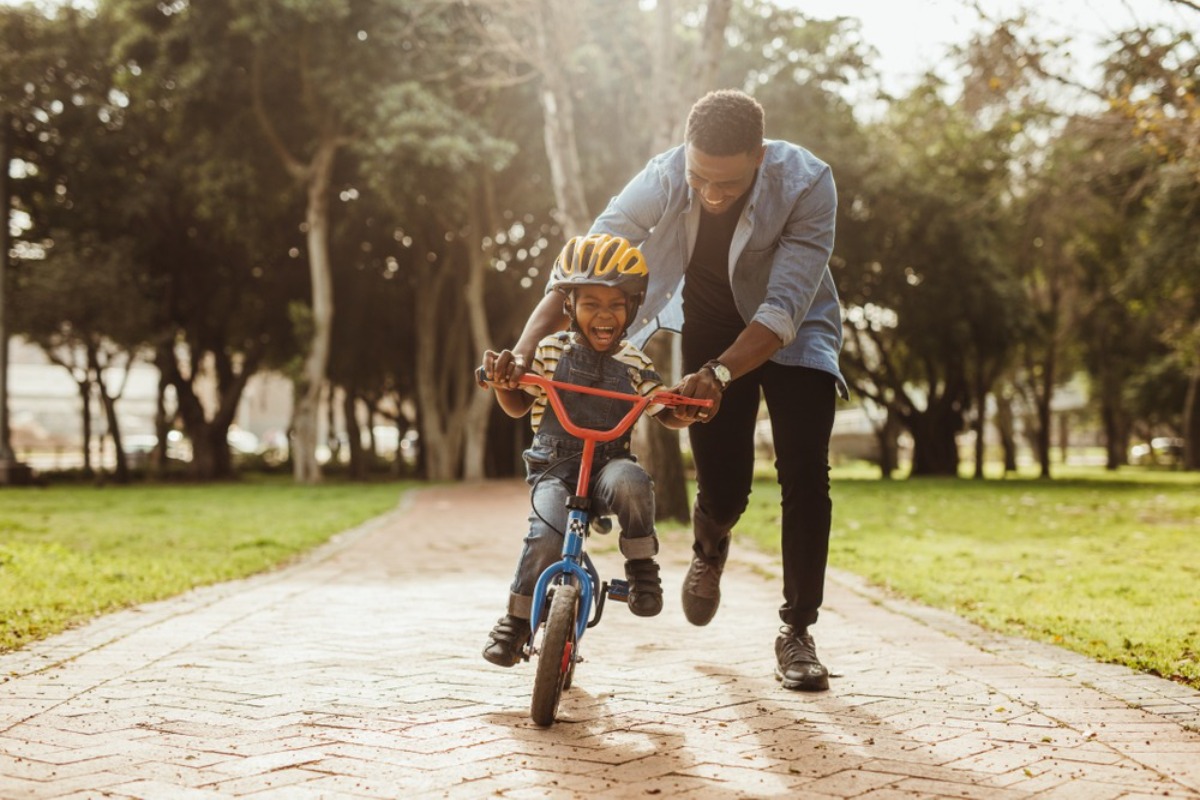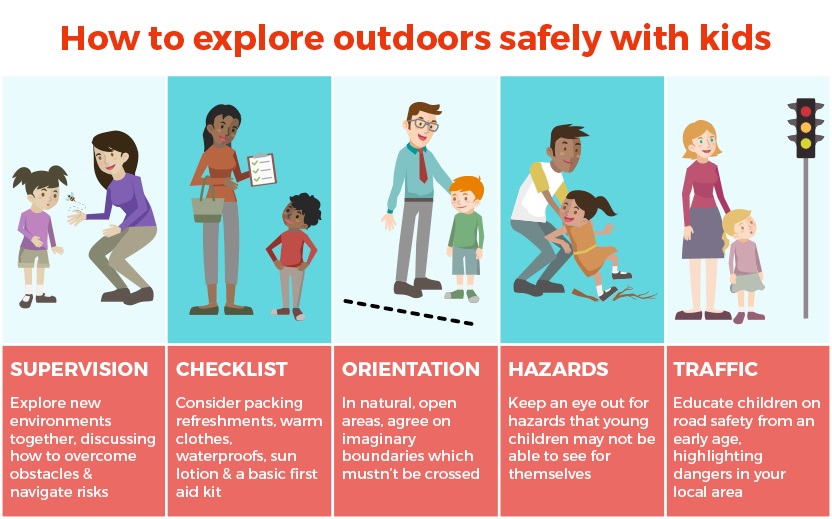
02 May, 2024/ by Abigail Lavery/News
Did you know that almost three-quarters of mums and dads (71%), with children aged between five and 15, would like their kids to spend more time outside as the days get warmer and longer? Getting your child to play outdoors can improve their mental health. Yet many children refuse to venture outside possibly because they don't like the weather. Now it's getting warmer, are you a parent keen for more time for your child to get more air and exercise this summer? If so, we have collated some tips on how you can explore the outdoors safely with your kids.
How do I entertain my child outside?
There are many ways to entertain your child outside and once they start enjoying themselves you will be surprised at how they end up entertaining themselves. Now that summer is approaching, how about taking a picnic in the local park as a family? You can prepare food before you leave rather than buying snacks, making it a cost-effective activity where your children can take in the fresh air and get active with a run around after eating.
Another fun way to get outside is to explore the undergrowth for wildlife. You can even do this in your back garden or, for more nature, try your local park. Perhaps document what you find by getting your child to jot things down on paper - entertaining your children outside in this way can also educate them at the same time.
Even going for a brisk stroll can get your children outside in the summer and exercising gently. We know being a busy parent can leave little quality time to chat day-to-day, so this is also a great opportunity to talk to them.
What is the best outdoor activity in the summer?
When thinking about how to successfully get your kids playing outside this summer, you should consider what outdoor activities they can pursue. So, we have chosen some of the UK kids' favourite outdoor activities to try this summer. And guess what…they are all free! Why not get your children to try:
- balancing a stone on the back of their hands and racing with it without letting it fall
- using a thin stick and limboing with nature to get them exercising outdoors
- finding a tree they can hug to get them to literally fall in love with the great outdoors
- running for 20 seconds like the wind!
- making a maze for a snail to find its way out of using sticks
- testing their balancing skills on a fallen log
- mimicking insect movement such as wriggling like a worm or fluttering, like a butterfly
- bubble blowing with a DIY bubble mix
- lying on the grass and finding shapes in the clouds
However, we like to think the best outdoor activity in the summer for us has to be hide and seek. This can keep children busy for hours, especially if the group playing outdoors is large as each child will want their turn.
How can you keep a child safe while outdoors?
So it's all very well knowing how to entertain your children outdoors and some of the best outdoor activities for kids, but you also need to exercise outdoor safety with your kids. Public places can sometimes be dangerous so it's important to be mindful of potential hazards. Therefore, we have put together six expert tips on getting kids outdoors safely below so you can help prevent your child from having accidents.
Six expert tips for getting kids outdoors safely
1. Start early
When it comes to getting children outdoors safely, experts agree that starting early, and with parental supervision, is key.
Mike Murphy, Education Development Manager at the Sussex Wildlife Trust, says: "It's really important for children to learn life lessons about nature as a toddler when outings are managed by parents or a teacher. Then, later, they'll be familiar with the risks."
Professor of Childhood Education at Trondheim's Queen Maud University College Ellen Sandseter agrees. "It's so much better if children have experiences from a younger age - that's when they learn the most. Learning about nature from play situations can start from about age one."
2. Prioritise road safety
When it comes to traffic, educating children from an early age is once again vital, says Sandseter. "Teach children how to deal with the traffic as you walk with them, and regularly involve them in the assessment of dangers - it's a gradual thing.
"It's also important to teach children about the dangers in their specific neighbourhood," she adds.
Murphy emphasises the importance of modelling road safety so that children follow suit. "You need to model the way you should cross the road," he explains.
"It's all about repeat exposure to these kinds of risks, while the parent is there to guide and educate the child."
3. Establish imaginary boundaries
In natural, outdoor environments, the lack of clear boundaries can lead to parents fearing their child will wander off and get lost.
According to Sandseter, it can help to agree on imaginary borders, such as a tree or a rock that marks the edge of where the child can play.
“Talk to the children and explain why it's important for you to know where they are. Say: “You're allowed to play where you want, but don't go behind that tree or that stone or that lake,” she explains.
Murphy agrees that natural objects can help with orientation: “It can help to identify meeting points, like: ‘we'll meet you at the fallen tree', he adds.
4. Supervise outings
Regularly accompanying children on outdoor adventures is the backbone of building children's confidence from a young age, experts advise.
"One of the key messages we try to get across is that adults should regularly take kids out to their local woods, local beach or river," says Murphy.
"Over time, it becomes a safe place for the adult and the child, because you know where you can build a den, climb on a fallen tree or jump in a stream. The more you can negotiate that, the better equipped you are to deal with those situations."
Sandseter agrees: "When children are small, parents should come with the children, and get used to that outdoor environment themselves.
"Join the children out in nature to experience the same thing. Then, bit by bit, let them get their freedom."
5. Pack essentials
When it comes to packing for an adventure, experts agree that common sense rules.
While you might not need a full first aid kit, supplies like plasters can be useful, says Murphy. "If you're taking kids cycling it can be handy to have plasters, particularly if they go over and graze their knees."
Other useful items can include sun lotion, waterproofs, extra layers in case of cold weather, and refreshments.
6. Find local nature spots
If you think you don't have any natural areas nearby, think again. "In any urban places, there are still pockets of woodland, meadows and ponds," says Murphy. Here are his top tips on finding nature to explore nearby:
- Ordnance Survey Maps can reveal footpaths that take you to local, natural environments.
- The Wildlife Trust website offers a postcode tool to help find nature reserves in your area.
- Use the Woodland Trust‘s website to find all the wooded areas in your neighbourhood.
What to do if your child has an accident

If your child has an accident outside you need to know what to do. There are many different types of accidents which could occur in public such as:
- trips and fall
- injury as a result of falling play equipment
- an object falling on your child
- road traffic accidents
Accidents in public could result in your child suffering:
- physical injuries
- emotional damage
- Severe injuries such as a brain injury
- poor well-being
A key point to know about children and accidents outside is when to call an ambulance. The NHS advises that you call an ambulance if:
- they stop breathing
- are struggling to breath
- are unconscious and do not know what is going on around them
- have a cut that will not stop bleeding
- you cannot wake them up
- has their first-ever fit
If your child has an accident outdoors such as a minor injury you should take them to A and E.
If your child does have the unfortunate experience of an accident outside in public, you may be able to claim on their behalf with us at National Accident Helpline. We have been making successful personal injury claims for over 30 years, this includes for children and accidents in public. We know that your child suffering an injury can be painful for both you and your child. It can affect your life in many ways such as taking time off work and taking them to medical appointments.
If your child has suffered an accident in public, make their personal injury compensation claim today. Give us a call at , request a callback, or start their claim online.
Last updated 02.05.24